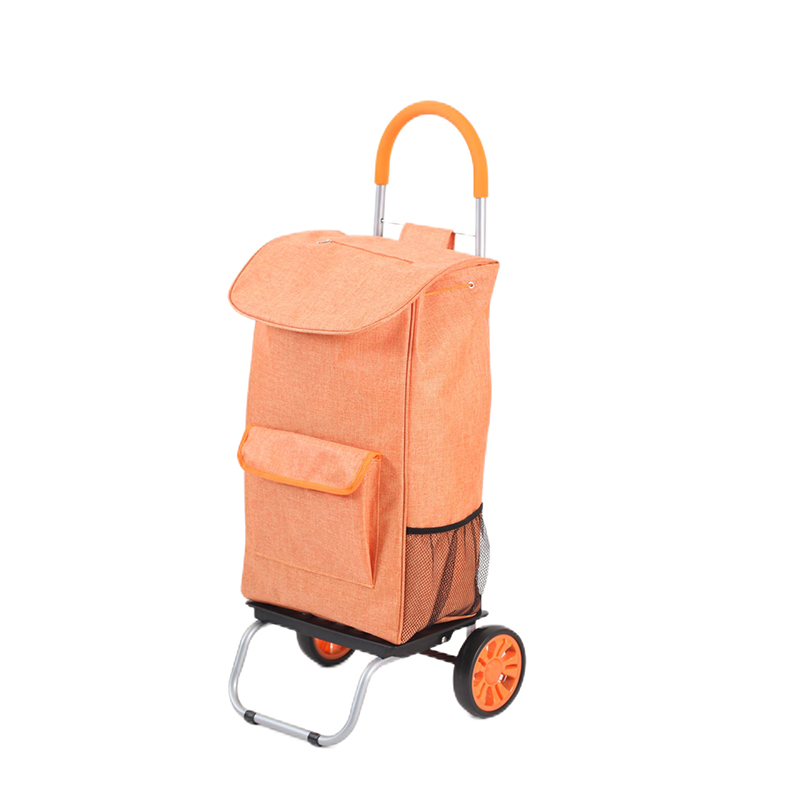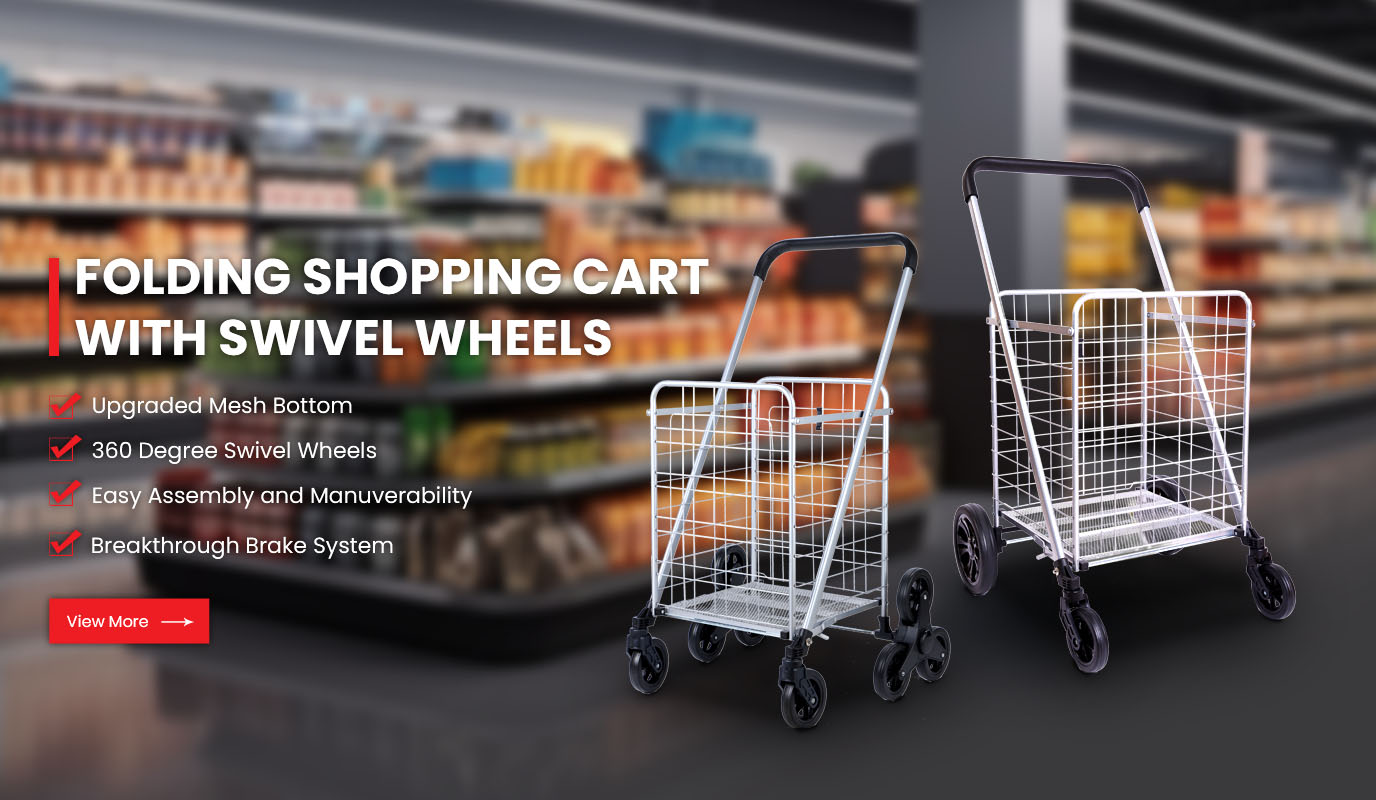-30℃ Shopping Cart Wheel Antifreeze Technology Innovation
Challenges for Shopping Carts in extreme environments
In an extremely cold environment of -30℃, the performance of ordinary shopping carts will fail systematically due to low temperature, especially the wheels of Trolley Bag Carts face severe tests:
Material embrittlement: The hardness of traditional rubber tires increases by 50% at -20℃, and they are prone to cracking at -30℃; plastic wheel hubs shrink at low temperatures, causing bearings to get stuck.
Lubrication failure: Low temperature solidifies ordinary grease, and the rolling resistance of the wheel set increases by 3 times, requiring an additional 5kg of force to push.
Snow resistance: Soft snow accumulates in the gap between the wheel axles, causing the wheel set to freeze and unable to rotate.
Antifreeze technology breakthrough: Collaborative innovation of materials and lubrication
1. Material innovation: from rubber to composite cold-resistant materials
Ultra-low temperature elastomer: Using hydrogenated nitrile rubber, it still maintains a Shore hardness of 60A at -50℃, and the elastic recovery rate exceeds 90%.
Glass fiber reinforced plastic wheel hub: PA66+30% glass fiber composite material, linear expansion coefficient as low as 3×10⁻⁵/℃, to avoid loss of bearing clearance caused by low temperature shrinkage.
Metal antifreeze coating: Molybdenum disulfide coating is sprayed on the axle surface, the friction coefficient is reduced from 0.15 to 0.03, and the wear resistance is increased by 5 times.
2. Lubrication technology revolution: self-heating and solid lubrication
Self-heating grease: Contains microencapsulated iron powder, which reacts with oxygen to release heat and maintain the axle temperature above -10℃.
Graphene solid lubrication: The axle is inlaid with graphene sheets, and the friction surface forms a self-lubricating film, which can achieve more than 100,000 low-resistance operations without grease.

Actual combat verification: Performance leap in -30℃ environment
1. Laboratory limit test
In a ring test box simulating -50℃, the wheel set of the new trolley bag cart performs as follows:
Low temperature rolling resistance: The driving force is reduced from 28N to 9N, reaching 80% of the normal temperature level.
Impact resistance: The wheel hub has no cracks in the drop ball impact test at -30℃.
Snow passability: The wheel spacing is expanded to 15mm, and with the sawtooth tread, the snow shedding rate is increased by 70%.
2. Polar field application
Availability: The wheel freezing rate is reduced from 65% to 3%, and the average daily usage frequency is increased to 40 times.
Maintenance cost: The grease replacement cycle is extended from 1 week to 6 months, and the annual maintenance cost is reduced by 83%.
User experience: The customer satisfaction score increased from 4.2 to 8.7 (out of 10 points) due to improved smoothness.
Technical details: Design logic of antifreeze wheel set
1. Thermodynamic structure optimization
Cavity insulation design: The honeycomb cavity is designed inside the wheel hub, and the air layer insulation makes the bearing area temperature 8℃ higher than the outside.
Heat recovery system: The rolling kinetic energy of the wheel set is used to drive the micro thermoelectric module, converting friction heat into electrical energy to power the self-heating lubrication system.
2. Intelligent temperature control system
Active heating: The wheel axle is equipped with a carbon fiber heating wire, which automatically starts when the temperature is lower than -15℃, and the power consumption is only 5W.
Wireless monitoring: The wheel temperature and lubrication status data are transmitted to the supermarket management system via Bluetooth to achieve preventive maintenance.
Future trend: From extreme cold to multi-scenario adaptation
1. Technical scalability
High temperature scenario: Replace the cold-resistant elastomer with silicone rubber to make the wheel set withstand 80℃ desert high temperature.
Marine corrosion: The wheel hub surface is coated with fluorocarbon coating to resist salt spray corrosion and extend the service life to 10 years.
2. Intelligent upgrade
Autonomous snow melting: The wheel set is embedded with piezoelectric ceramics, with a vibration frequency of 20kHz, which can shake off snow in real time.
Self-repairing function: The elastomer is added with microcapsule repair agent, and cracks can be self-healed within 24 hours at -30℃.
3. Environmentally friendly cycle
Biological-based materials: Synthetic rubber made of terpene compounds extracted from rosin reduces carbon emissions by 60% compared with petroleum-based materials.
Modular recycling: The wheels can be quickly disassembled into three categories: rubber, plastic, and metal, with a recycling rate of 95%.
Through the deep integration of material science and thermodynamics, the trolley bag cart's wheel antifreeze technology has successfully broken through the -30℃ limit. This technology not only solves the real pain points in extremely cold areas, but also verifies the general path for the development of extreme environment products - problem-oriented innovation + interdisciplinary collaboration. In the future, with the application of intelligent and environmentally friendly materials, low-temperature adaptability technology may redefine the way of life of humans in extreme scenarios such as polar regions and space.



